- Homepage
- Honey Mead
- Aerate the Must Before Brewing Mead
Aerate the must before brewing mead
Aerate the must before brewing mead for the yeast cells to multiply rapidly and prevent any wild culture gaining momentum.
Not many people will take the time to brew their own alcohol; and those that do enjoy their hobby for various reasons. The real motivation for me is that there is strong evidence that even small amounts of commercial booze increase the risk of cancer.
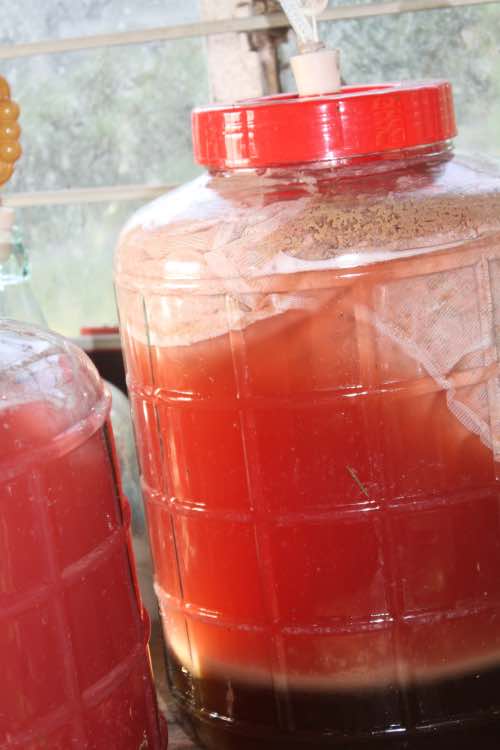 Fully aerated cherry guava mead
Fully aerated cherry guava meadSo few people drink natural wines and beers that it's very difficult to research. What is known is that those living in four of the five Blue Zones of the world drink quite a lot of alcohol but it is neither pasteurised nor sterilized with sulphites; with their meals. Yet they continue to a very ripe old age.
The Adventists in the fifth Blue Zone in Loma Linda, California are teetotalers.
"17,000 new cases of malignant tumours occur each year in the UK alone, directly from commercial alcohol."
- International Agency for Research on Cancer
Cancer is the sixth most common cause of death worldwide; and it's significantly higher in those drinking commercial alcohol. There is circumstantial evidence that this is not true of those enjoying a homebrew; in fact it may be protective because of the live cultures that act as probiotics.
Aerate the must before brewing mead
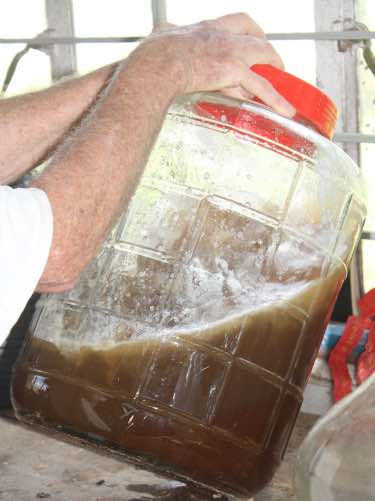 Aerating the must beats going to the gym
Aerating the must beats going to the gymThe traditional way to aerate your mead is to take the carboy in your arms and slosh it about for ten minutes. But that heavy glass container has 8kg of honey and another 5 litres of water in it. It weighs nearly 20 kilogrammes. What's more it may be a slippery customer.
And the value amounts to R700 + R1600; drop it and you are in for a big loss and a huge mess.
Half fill the carboy and rock the boat
So I now half fill the carboy, tighten the lid and place it on a counter; and then vigorously rock it back and forth for ten minutes. Here it is on a wooden workbench; not ideal as there is some spillage but it would be more difficult on stone or plastic.
You could place it on a non-slip rubber mat.
Then add the fruit
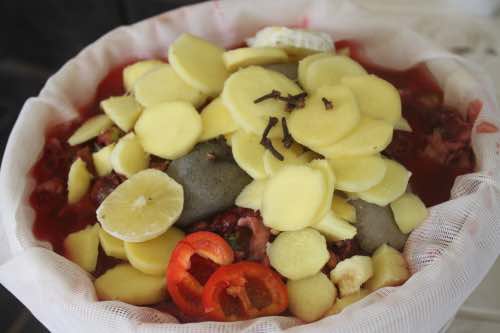 The fruit used in making a cherry guava mead
The fruit used in making a cherry guava meadThen you can add the fruit in a porous bag, suitably weighted down so it doesn't float and top it up with unchlorinated water; and an astringent tea.
Add the hydrated yeast and Bob's your uncle; if you have taken the trouble to aerate the must before brewing mead you will find that fermentation begins within hours rather than days. The very satisfying bleep from the bubbler is music in our ears!
It takes a pretty full morning to pick and prepare the fruit, aerate the must and get everything ship-shape.
Is it worth all that trouble?
Pascal was an eminent French scientist from four centuries ago; he is generally recognised as the father of Probability Theory.
There is a rather fun exercise known as Pascal's Wager except in this instance it is a little sobering. You have to make a choice; you cannot sit on the fence. There is a significant possibility that commercial alcohol will cause me to die of cancer; yes or no?
The research is strong; even one glass of commercial wine per week significantly increases the risk of cancer.
Pascal would argue that you have to make one of two choices; become teetotaler or a home brewer. In the first you give up on the joys of alcohol or make a considerable amount of time to ferment your own; both a considerable loss.
But compared with the possibility of losing your whole life to cancer it is a very small cost.
Commercial alcohol causes cancer
Pascal won't allow you to be an ostrich and put your head in a hole in the ground; you have to make a choice! To brew or not, become a meader, that is the question.
Quality mead is not cheap
Mead is not an inexpensive alcoholic beverage to make. It is only worth investing all this time if you use a top quality honey; it's not cheap. The greatest cost is the hours committed however.
That leads to the next step. Instead of purchasing good quality honey, should I become a beekeeper? It is worth considering. I am a man of hobbies and this is the one that has stood the test of time; I have quit gliding and don't do much turning on the lathe any longer. Trout fishing is long gone but a day never passes when I do not pop into the apiary to see how my little friends are doing.
There's a synergy of green living that keeps the momentum going; one thing leads to another. It is one of features of Cyan Zone people; caring for the self and for the planet.
Only those who are determined to ring in the lifestyle changes that make zestful, healthy old age a real possibility will invest all this time; and are equally concerned to leave behind a pristine world for their offspring.
For me it's meant turning my back to a large degree on television and social media. I would rather have fun myself and than watch others enjoying life.
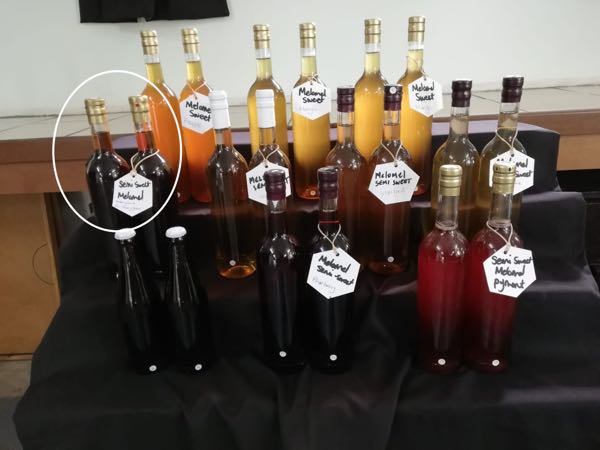 Bernie's award winning cherry guava mead
Bernie's award winning cherry guava meadAerate the must before brewing mead
Aerate the must before brewing mead; then it changes to airless conditions for producing the alcohol.
In scientific jargon the word for airless in anaerobic.
All those sugars
Some may be concerned about all those sugars contributing to their diabetes and obesity. You can relax on that score. After the first two days when the yeast cells are rapidly multiplying, they turn instead to anaerobically changing all that honey into alcohol. That's why a bubbler is needed; to keep air out and allowing the carbon-dioxide to escape.
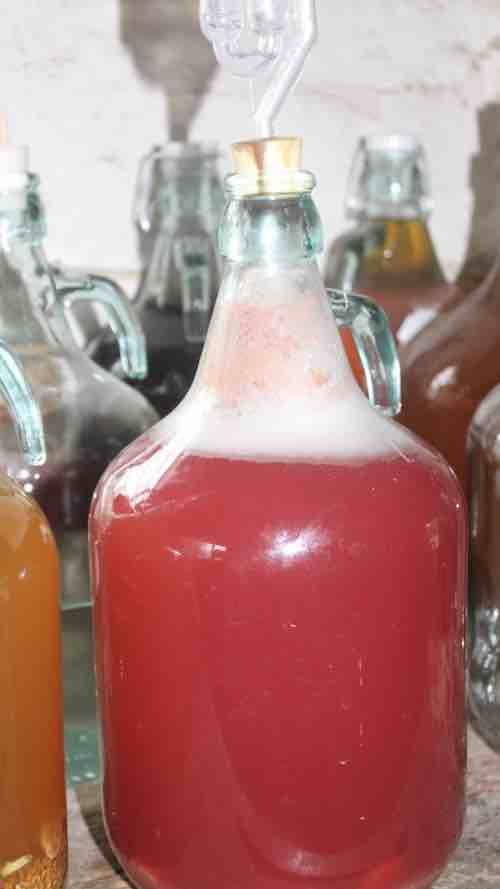
When browsing use right click and "Open Link in New Tab" or you may get a bad gateway signal.
What does aerate wine mean?
"A bottle of wine contains more philosophy than all the books in the world."
- Louis Pasteur
Aerating wine and the must are two different concepts.
When first brewing wine or mead the yeast cells must multiply rapidly; so the carboy is vigorously rocked to dissolve oxygen in the liquid.
Once mature some wines and meads will benefit from aerating before drinking; exposing the alcohol to air. However it's not helpful with others. Really it is a matter of personal taste.
Once pasteurised alas wines, beers and meads have only a fraction of the wisdom and philosophy of books; at least that's Bernard Preston's opinion.
The material expressed on this page is gleaned from the nutritional and environmental literature; it is clearly referenced. A plain distinction is made between the author's opinion and that which is scientifically proven. When in doubt consult your health professional.
To suggest a correction or clarification, write to Dr Bernard Preston here. Contact.
Newsletter
Our newsletter is entitled "create a cyan zone" at your home, preserving both yourself and Mother Earth for future generations; and the family too, of course. We promise not to spam you with daily emails promoting various products. You may get an occasional nudge to buy one of my books.
Here are the back issues.
- Lifestyle and ideal body weight
- What are ultra-processed foods?
- Investing in long-term health
- Diseases from plastic exposure
- Intensive lifestyle management for obesity has limited value
- A world largely devoid of Parkinson's Disease
- The impact of friendly bacteria in the tum on the prevention of cancer
- There's a hole in the bucket
- Everyone is talking about weight loss drugs
- Pull the sweet tooth
- If you suffer from heartburn plant a susu
- Refined maize meal and stunting
- Should agriculture and industry get priority for water and electricity?
- Nature is calling
- Mill your own flour
- Bake your own sourdough bread
- Microplastics from our water
- Alternative types of water storage
- Wear your clothes out
- Comfort foods
- Create a bee-friendly environment
- Go to bed slightly hungry
- Keep bees
- Blue zone folk are religious
- Reduce plastic waste
- Family is important
- What can go in compost?
- Grow broad beans for longevity
- Harvest and store sunshine
- Blue zone exercise
- Harvest and store your rainwater
- Create a cyan zone at your home
Did you find this page interesting? How about forwarding it to a friendly book or food junkie? Better still, a social media tick would help.
- Homepage
- Honey Mead
- Aerate the Must Before Brewing Mead
Address:
56 Groenekloof Rd,
Hilton, KZN
South Africa
Website:
https://www.bernard-preston.com